|
|
|
Sort Order |
|
|
|
Items / Page
|
|
|
|
|
|
|
| Srl | Item |
| 1 |
ID:
134077
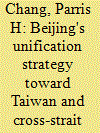

|
|
|
|
|
| Publication |
2014.
|
| Summary/Abstract |
For almost a decade, Beijing has pursued a "soft" approach toward Taiwan, cultivating economic ties and political exchanges in its pursuit of reunification. Following the end of President Chen Shui-bian's term in office, which was marked by constant tensions and several crises with China, Beijing has colluded with his successor, Ma Ying-jeou to pursue a policy of economic integration with the mainland. Beijing's
strategy toward Taiwan under Chairman Xi Jinping and his predecessor Hu Jintao has yielded positive results. The approach not only avoids possible military conflict with the United States, but receives support from Washington. Beijing's economic means, such as the Economic Cooperation Framework Agreement (ECFA), have enhanced Taiwan's economic integration with China and greatly increased the
PRC's control over Taiwan's economy and society, helping to lock Taiwan into the mainland's orbit. Likewise, Beijing has developed tools that allow it to intervene directly in Taiwanese domestic politics. However, efforts to use ties with President Ma to bring Taiwan farther into the PRC orbit have backfired, resulting in a weakened presidency that cannot deliver Beijing's goals. Thus, Beijing appears to be looking ahead to the next two elections, trying to make as much progress as possible before Ma leaves office, while simultaneously trying to establish ties with possible successors and the opposition DPP. In 2012, Beijing's intervention assisted the reelection of President Ma. It is sure to try again in Taipei's mayoral election in 2014 and the presidential/parliamentary elections in 2016.
|
|
|
|
|
|
|
|
|
|
|
|
|
|
|
|
| 2 |
ID:
184225
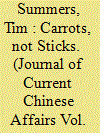

|
|
|
|
|
| Summary/Abstract |
This analysis offers a historical assessment of “economic statecraft” in Beijing's approach to Hong Kong from 1997 to 2020. It discusses how the concept of “economic statecraft” can be applied to Beijing–Hong Kong relations given the nature of the “one country, two systems” framework, and looks at some differing perceptions about economic statecraft in Hong Kong. It argues that, during this period, economic tools were in general used by Beijing relatively sparingly, and in the form of inducements rather than coercion. In conclusion, the analysis suggests that the contested interpretations of Beijing–Hong Kong economic relations demonstrate that “economic statecraft” is to a certain extent in the eye of the beholder.
|
|
|
|
|
|
|
|
|
|
|
|
|
|
|
|
| 3 |
ID:
116639
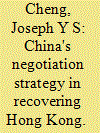

|
|
|
|
|
| Publication |
2012.
|
| Summary/Abstract |
This article focuses on Beijing's negotiation strategy and its preparations regarding the conclusion of the Sino-British Joint Declaration. The negotiation process is divided into several important stages, and a framework is offered for further research. The Chinese decision-making processes before the negotiations startedwere detailed and scientific. The decision to recover Hong Kong by 1997 was certainly influenced by nationalist considerations, andChinese leaders werewilling to pay the price. The "one country, two systems" policy for Hong Kong demonstrated the Chinese leadership's liberation in thinking at that time, and that it was ready to adopt a set of highly pragmatic guidelines to secure the confidence of the Hong Kong people and to maintain the territory's stability and prosperity. In contrast, the British side did not have a good understanding of the situation in China. In particular, the British seriously neglected the impact of nationalism on the Chinese leadership and the Hong Kong people.
|
|
|
|
|
|
|
|
|
|
|
|
|
|
|
|
| 4 |
ID:
108795
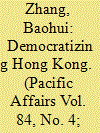

|
|
|
|
|
| Publication |
2011.
|
| Summary/Abstract |
The system of functional representation constitutes the greatest challenge to political reform in Hong Kong. Utilizing recent developments in institutional and ideational theories in political science, this article explores how both power and ideas shape the politics of reforming functional representation. The impasse generated by the current balance of power has given rise to a plethora of ideas that seek to reform the system while preserving its place in the political process. However, recent direct negotiations between Beijing and moderate democrats in Hong Kong have triggered a significant political realignment. This shift in the political balance of power has generated new scenarios for the reform of functional representation.
|
|
|
|
|
|
|
|
|
|
|
|
|
|
|
|
| 5 |
ID:
174537
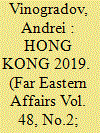

|
|
|
|
|
| Summary/Abstract |
The massive protests in Hong Kong in 2019 became part of a growing movement by people opposed to joining the Mainland after half the period stipulated in the 1997 agreement between Great Britain and China for gradual reunification of the PRC and Hong Kong in 2047. Despite close and mutually beneficial economic cooperation, the unification of the two systems is not proceeding. On the contrary: There is a growing clash of identities in the Special Administrative Region of Xianggang. The population of Hong Kong is striving to preserve its autonomy and civil rights. This mood is especially strong among the young generation, which has emerged as the main force driving the protests. The victory of those against integration with Beijing in the elections to the legislative councils in November 2019 could mark the beginning of political opposition to the policy of reunification with Beijing and cast doubt on the overall feasibility of the concept "One country, two systems," and the prospects for extending it to relations with Taiwan. It also poses a threat to realizing "the Chinese dream of a great rebirth" and restoring to China its world-shaping functions in the international arena.
|
|
|
|
|
|
|
|
|
|
|
|
|
|
|
|
| 6 |
ID:
160427
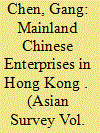

|
|
|
|
|
| Summary/Abstract |
This paper examines the under-researched subject of the political and economic functions of Mainland Chinese enterprises in Hong Kong. The lack of effective cross-border supervision of these offshore state assets has exacerbated the longstanding principal–agent problem, resulting in spillover effects such as high property prices and worsening corporate corruption.
|
|
|
|
|
|
|
|
|
|
|
|
|
|
|
|
| 7 |
ID:
100998
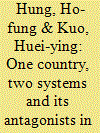

|
|
|
|
|
| Publication |
2010.
|
| Summary/Abstract |
In turning the vast and diverse territory of the Qing Empire into a singular nation-state, Beijing has kept redefining its conception and institution of nationhood in response to challenges from the recalcitrant or not-yet-incorporated peripheral regions including Tibet, Hong Kong, and Taiwan. Since 1949, Beijing has attempted to solve the Tibet and Taiwan questions with the institutional design of "one country, two systems." This design, widely thought of as a 1980s invention, can in fact be dated back to the early 1950s with respect to Tibet. This design has been far from successful in Tibet and Taiwan. While the "one country, two systems" experiment in Tibet failed with the Lhasa uprising and the flight of the Dalai Lama in 1959, the proposal of "one country, two systems" lost its appeal and had become a taboo among politicians of all strips in Taiwan by the 21st century. In this article, we argue that the success of "one country, two systems" requires a very delicate balance and virtuous interaction between the political center in Beijing and the elite, as well as popular classes, in the periphery concerned. It can easily be jeopardized if the center tilts too much to the left or right.
|
|
|
|
|
|
|
|
|
|
|
|
|
|
|
|
| 8 |
ID:
193218
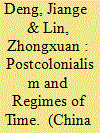

|
|
|
|
|
| Summary/Abstract |
Temporality is important for understanding Hong Kong's postcolonial status since its handover from Britain to China in 1997. This study examines the mediated regimes of postcolonial temporalities in coverage of five anniversaries of the Hong Kong handover (between 1998 and 2020) in Chinese and British newspapers. In 1998, the Chinese and British press shared a significant consensus regarding the “legitimate continuity” of Hong Kong's colonial legacies; however, this consensus was increasingly undermined by ideological contestations surrounding the city's postcolonial ruptures and differences. The multiple temporal claims that emerged in Chinese and British newspapers were systemized within a proposed framework that combined temporal modes (the “formal structures” of temporal relations) and ideological appraisals (the “general politics” where temporal modes are (il)legitimized and (ab)normalized). The temporal complexity concerning Hong Kong exemplifies the former colony's dilemmatic “in-betweenness” and temporal inconclusiveness, which create an open discursive space that invites ideological investments by powerful symbolic stakeholders.
|
|
|
|
|
|
|
|
|
|
|
|
|
|
|
|
| 9 |
ID:
179972
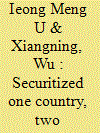

|
|
|
|
|
| Summary/Abstract |
This paper examines how Macau, with a different political and legal system under the “one country, two systems” principle, fits into China’s securitization and what impact that has on its local governance. We argue that in recent years Macau’s legal system has gradually transformed into a means of social control. Through case files related to the Assembly and Demonstration Law drawn from the Court of Final Appeal, we demonstrate that although Macau is unlike Hong Kong, where dissidents are subject to severe repression, Beijing’s emphasis on national security has weakened the checks-and-balances function of Macau’s legal system and substantially narrowed the scope of freedom of speech, even though it is nominally guaranteed and protected by the Basic Law.
|
|
|
|
|
|
|
|
|
|
|
|
|
|
|
|
|
|
|
|
|